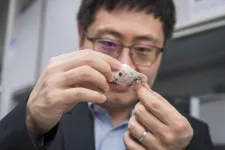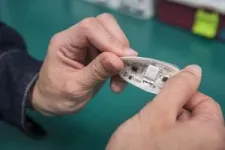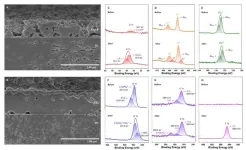(Press-News.org) Super wearable electronics that are lightweight, stretchable and increase sweat permeability by 400-fold have been developed by scientists at City University of Hong Kong (CityUHK), enabling reliable long-term monitoring of biosignals for biomedical devices.
Led by Professor Yu Xinge in CityUHK’s Department of Biomedical Engineering (BME), the research team has recently developed a universal method to creating these super wearable electronics that allow gas and sweat permeability, solving the most critical issue facing wearable biomedical devices.
Wearable electronics play a significant role in promoting health and fitness. Continuous monitoring of physiological signals over a prolonged period is essential for gaining a comprehensive perspective on an individual's overall health status, early disease prediction, personalised therapeutics and improved management of chronic health conditions.
However, the long-term signal stability could be influenced by sweat or air permeability. Professor Yu and his team have put in significant effort into addressing the need for wearable devices that can provide continuous and stable monitoring of vital signs without causing discomfort or signal disruption brought about by perspiration.
Resolving this challenge, the team has developed a fundamental methodology from materials processing, device architecture and system integration for integrated permeable wearable electronics based on a nature-inspired three-dimensional liquid diode (3D LD) configuration, in which surface structures facilitate the spontaneous flow of liquids in a specific direction.
The findings have recently been published in the prestigious journal Nature under the title “A three-dimensional liquid diode for soft, integrated permeable electronics”.
“Incorporating a 3D spatial liquid manipulation technique, we have achieved fully integrated permeable electronics that match the circuitry and functionality to state-of-the-art wearable devices, enabling superb breathability,” said Professor Yu. “The 3D LD does not rely on unique materials but adopts an in-plane liquid transport layer called the horizontal liquid diode.”
In the study, the device that the team created can transport sweat from the skin 4,000 times more effectively than the human body can produce it, ensuring seamless monitoring even in sweating conditions, solving the issue of signal disruption caused by sweat accumulation at the device-skin interface.
And because of its thin, lightweight, soft, and stretchable features, the device demonstrated exceptional compatibility with the human body, effectively adhering to the skin, maintaining a comfortable and stable interface between the device and the skin, providing high-quality signals.
“Our findings provide fluid manipulation and system integration strategies for the soft, permeable wearables. We have successfully applied this technology to both advanced skin-integrated electronics and textile-integrated electronics, achieving reliable health monitoring over a weeklong duration,” said Professor Yu.
Currently, the team is advancing to clinical trials to confirm the effectiveness of their technology in real-world scenarios.
Professor Yu is the corresponding author. Dr Zhang Binbin, Dr Li Jiyu, Zhou Jingkun, and Chow Lung are the paper's first authors. Dr Zhang and Dr Li are postdoctoral fellows in the BME and Hong Kong Centre for Cerebro-Cardiovascular Health Engineering, an InnoHK centre. Mr Zhou Jingkun and Mr Chow are PhD students under the supervision of Professor Yu.
END
Super permeable wearable electronics developed for stable, long-term biosignal monitoring by scientists at City University of Hong Kong
2024-03-27
ELSE PRESS RELEASES FROM THIS DATE:
Improving the safety of HED LIBs by co-coating separators with ceramics and solid-state electrolytes
2024-03-27
They published their work on Mar. 20, 2024, in Energy Material Advances.
"TR poses a critical safety concern for HED LIBs," said paper author Jiantao Wang, the general manager of National Power Battery Innovation Center, the general manager of China Automotive Battery Research Institute Co., Ltd, professor in General Research Institute for Nonferrous Metals. "It hinders HED LIBs wide application in electric vehicles."
Wang explained that TR can occur during various ...
A decade of aphantasia research: what we’ve learned about people who can’t visualize
2024-03-27
People who can’t visualise an image in their mind’s eye are less likely to remember the details of important past personal events or to recognise faces, according to a review of nearly ten years of research.
People who cannot bring to mind visual imagery are also less likely to experience imagery of other kinds, like imagining music, according to new research by the academic who first discovered the phenomenon.
Professor Adam Zeman, of the University of Exeter, first coined the term aphantasia in 2015, to describe those who can’t visualise. ...
Implantable batteries can run on the body’s own oxygen
2024-03-27
From pacemakers to neurostimulators, implantable medical devices rely on batteries to keep the heart on beat and dampen pain. But batteries eventually run low and require invasive surgeries to replace. To address these challenges, researchers in China devised an implantable battery that runs on oxygen in the body. The study, published March 27 in the journal Chem, shows in rats that the proof-of-concept design can deliver stable power and is compatible with the biological system.
“When you think about it, oxygen is the source of our life,” says corresponding author Xizheng Liu, who specializes in energy materials and devices at Tianjin University of Technology. “If ...
Sap beetles vs wind: what pollinates screw pines?
2024-03-27
Researchers Toru Miyamoto, Ko Mochizuki, and Atsushi Kawakita of the University of Tokyo have discovered the first species pollinated by sap beetles in the genus Pandanus, a group of palm-like plants native to the tropics and subtropics of Africa and Eurasia. The discovery overturned the long-held belief that these plants were pollinated by wind. The researchers also found that fragrant screw pines’ male and female flowers produced heat at night stably, making them the first such species in the family Pandanaceae. The findings were published in ...
New trial highlights promising intervention to reduce sitting and improve blood pressure in older adults
2024-03-27
A new Kaiser Permanente study found that a health coaching intervention successfully reduced sitting time for a group of older adults by just over 30 minutes a day. Study participants also showed meaningful improvements in blood pressure, comparable to the effect of other interventions focused on physical activity.
The study was published March 27 in JAMA Network Open and included 283 Kaiser Permanente Washington members aged 60-89.
Older adults typically sit for between 65 and 80 percent of the hours that they are awake, and strong evidence shows that ...
Physical activity and incident obesity across the spectrum of genetic risk for obesity
2024-03-27
About The Study: Individuals at high genetic risk of obesity needed higher daily step counts to reduce the risk of obesity than those at moderate or low genetic risk in this study of 3,124 adults. Population-based recommendations may underestimate physical activity needed to prevent obesity among those at high genetic risk.
Authors: Evan L. Brittain, M.D., M.Sc., and Douglas M. Ruderfer, Ph.D., of the Vanderbilt University Medical Center in Nashville, are the corresponding authors.
To access the embargoed study: Visit our For The Media website at this link https://media.jamanetwork.com/
(doi:10.1001/jamanetworkopen.2024.3821)
Editor’s Note: Please ...
Researchers create new tool for assessing risk of kidney injury after chemotherapy
2024-03-27
Using patient data from six major U.S. cancer centers, Brigham researchers and collaborators developed a risk prediction model for moderate-to-severe kidney injury after receiving the chemotherapy drug cisplatin in the largest, first generalizable study of its kind
Cisplatin is a highly effective chemotherapy that has been used to treat cancer for decades, but it can cause kidney injury that can potentially lead to the discontinuation of life-saving cancer treatments. Investigators from Brigham and Women’s Hospital (BWH), a founding member of the Mass General Brigham healthcare system, with researchers from the Dana-Farber Cancer Institute and other institutions, ...
Estimated sustainable cost-based prices for diabetes medicines
2024-03-27
About The Study: High prices limit access to newer diabetes medicines in many countries. The findings of this study suggest that robust generic and biosimilar competition could reduce prices to more affordable levels and enable expansion of diabetes treatment globally.
Authors: Melissa J. Barber, Ph.D., of the Yale Collaboration for Regulatory Rigor, Integrity, and Transparency in New Haven, Connecticut, is the corresponding author.
To access the embargoed study: Visit our For The Media website at this link https://media.jamanetwork.com/
(doi:10.1001/jamanetworkopen.2024.3474)
Editor’s ...
Higher genetic risk of obesity means working out harder for same results
2024-03-27
Persons with a higher genetic risk of obesity need to work out harder than those of moderate or low genetic risk to avoid becoming obese, according to a Vanderbilt University Medical Center (VUMC) paper published in JAMA Network Open.
Study authors used activity, clinical and genetic data from the National Institutes of Health’s All of Us Research Program to explore the association of genetic risk of higher body mass index and the level of physical activity needed to reduce incident obesity.
“Physical activity guidelines do not ...
The ISSCR announces 2024 election results
2024-03-27
Evanston, IL – The International Society for Stem Cell Research (ISSCR) is pleased to announce the results of its 2024 election. Lorenz Studer, MD, founding director of the Center for Stem Cell Biology and member of the Developmental Biology Program, Memorial Sloan Kettering Cancer Center, USA, will become the next Vice President. All terms of office for the new leaders will begin on 1 July 2024.
The following three members were newly elected to the ISSCR Board of Directors for a three-year term:
Jacqueline Barry, PhD, ...







